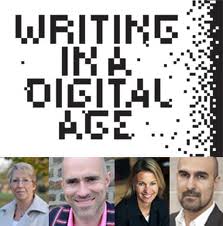Yesterday I went to Writing in a Digital Age, a conference run by The Literary Consultancy and the Free Word Centre which highlighted some current trends. There was a good cross section of views: Robert Kroese, a self published US novelist whose Mercury Rises novels have been picked up by Amazon; a panel of international writers and poets chaired by Ellah Allfrey, deputy editor of Granta, and (the highlight for me) a smorgasbord of agents and editors given seven minutes each to summarize their approach and pitch their views.
The agent/editor slot was a piece of inspired programming. Each contributor was the prisoner of their own slide-show, required to keep pace with the changing images. They revealed more of themselves and their true passions than any group of publishing professionals than I have ever seen before (and I am a veteran of these gigs) and it was great to see/be reassured that traditional publishing may be undergoing seismic change, but still has much to offer both the would-be writer and battle-weary mid-listers like me.
While the conference raised more questions than it answered, it was a fascinating and surprisingly inspiring day. I suppose this surprised me because my suspicion is that digital might be unicode for 'tekkie faddism' in which originality is overlooked in favour of formulaic and genre-throttled dead cert fiction. (Which usually ends up being just as much a hostage to fortune as any other kind.)
But the message, coming loud and clear from all concerned, was that digital writing may offer new platforms for fiction and new routes to readers, but it is not a quick fix in literary terms.
Just to be completely old school for a moment, Thomas Carlyle described genius as 'a capacity to take infinite pains' and anyone thinking of self-publishing in the e-universe would do well to have this maxim pinned over their desk. Turgid narratives, editorial inaccuracies and Awful Covers are all marks of the hopeless amateur.
And the words come first - and last. As Kroese pointed out, digital success is no more accidental than success in traditional publishing. You need to work for it - and you need to spend time not just writing the best possible book, but presenting it in the most professional possible way.
